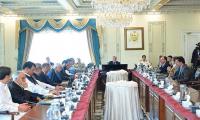Islamabad : The World Bank has just released a report on “global social protection responses to COVID-19”. This report is called the “living paper” and it is a partnership effort involving 18 coauthors and a large number of contributors; the paper presents a 650-page volume and accompanying database documenting how countries and territories are planning, implementing or completing social protection measures in the context of the pandemic.
The report states that there has been “an exponential growth in social protection measures between March 20, 2020 and May 14, 2021 and that a total of 3,333 social protection measures have been planned or implemented in 222 countries or territories”.
Pakistan ranks 4th globally in terms of the number of people covered and 3rd globally in terms of percentage of population covered amongst those that covered over 100 million people; the World Bank has stated that only “select countries have attained impressive six-digit levels” in this regard. Pakistan’s Ehsaas Emergency Cash is one of them. The lead author of the paper is Ugo Gentilini, lead of Social Protection at the World Bank. The report is accompanied by an excel sheet as well to make available the larger volume of data. According to the report, Pakistan’s Ehsaas also ranked high amongst the programs that did well in terms of Planned versus actual coverage rates. According to the report, most of social protection measures are provided as social assistance. These represent 55% of global programs and are the predominant form of support in most regions. Among social assistance measures, cash transfers remain the premier instrument. A total of 734 cash-based measures have been planned or implemented in 186 countries. Highest level of spending in lower middle-income countries category is observed in Mongolia Zimbabwe, Bolivia, and Pakistan. One of the special features of the report is on delivery matters. According to the report, globally, there were essentially four ways to find and enroll new beneficiaries, the first of which was to simply add households to the list from an existing social registry. Pakistan adopted an innovative hybrid targeting approach to enroll new beneficiaries combining emergency assistance for the known vulnerable with demand-based support for the “new poor”. Requests were sought through an 8171 SMS short code service and web-portal. Data analytics enabled eligibility ascertainment, using unique national identification numbers, and drawing on the National Socio-economic Registry and wealth proxies (travel, taxes, billing, assets ownership data and government employment status). The system was end-to-end data-driven, fully automated, rule-based, transparent, and politically neutral. Payments were biometrically verified.
Ehsaas Emergency Cash delivered cash stipends of Rs. 12,000 to 15 million households last year, which meant helping over 100 million people or half the country’s population, representing the largest and most extensive social protection intervention ever in the history of the country.
The legacy of this programme is not just short-term relief. Ehsaas Emergency Cash will be an important component of the redesign of social protection, post COVID-19 and will help in the great global reimagination of social welfare envisaged in Ehsaas.
Asma Jahangir Conference. — Twitter/FileLAHORE:The Asma Jahangir Legal Aid Cell will be hosting the Asma Jahangir...
This representational image shows Solar panels. — Unsplash/FileLAHORE: Chinese Consul-General Zhao Shirin Thursday...
Participants attend the informative “PhD Scholars workshop arranged by the University of Veterinary & Animal...
Lahore College for Women University Vice Chancellor Prof Dr Shagufta Naz seen in this image. — LAHORE COLLEGE FOR...
Provincial Minister of Specialized Healthcare and Medical Education Khawaja Salman Rafique addresses an event on March...
Punjab Assembly Speaker Muhammad Ahmad Khan addresses media persons in this still on April 25, 2024. —...







